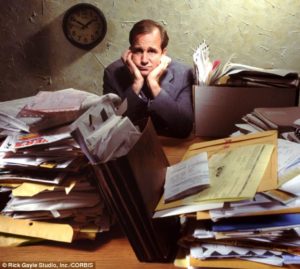During 2013 to 2016, 8.1 percent of American adults aged 20 years and older had depression in a given two-week period, according to a February data brief published by the U.S. Centers for Disease Control and Prevention’s National Center for Health Statistics. Read more here.
During 2013 to 2016, 8.1 Percent of U.S. Adults Had Depression
The Link Between Disorganization, Depression and Anxiety
Although it appears to be a mundane sort of thing, I find disorganization and chaos to be one of the biggest problems reported by depressed and anxious individuals. Emotional baggage has a way of building up and then expressing itself in an outward display of turmoil — as if a tornado had let loose in your brain and your surroundings.
The symptoms of feeling overwhelmed and not wanting to face the day often stem from not knowing where to start or not wanting to face the mountain of tasks that lay ahead. I have found folks to be so bogged down with even the everyday task of leaving the house on time that their entire day is a mess before they ever get started. By 8 am they are frazzled.
There are screaming children, pets that need walking, work begins at a certain time, the laundry isn’t done, and available clothing is something picked out of the bin from the week before that didn’t make it to the dry cleaner. Stress chemicals are running rampant, and irritability and panic set in as well as resentment of the household, job, family and everything else.
What is worse is that typically if disorganization is a problem at home it is a problem at work as well. A cluttered desk, half-finished tasks, and unmet deadlines are the career version of the problem and are also with you all day.
Does your automobile look like a homeless person’s shopping cart? If so, none of your major environments is peaceful. There is nothing pleasant about your surroundings, and this is a major stressor.
The problem is not that you have too much to do or work full time, it is that you have not found a routine and effective organizational plan, or you found one but are not consistent in following the plan.
Running around willy-nilly, being chronically late, never being able to find things, and having a dirty or sloppy house are stressful conditions and contribute to the anxiety depression cycle. Things scattered about affect your ability to concentrate, and irritability sets in if not outright anger.
Simply put, the stress chemicals from disorganization eat up the good chemicals needed for mood stabilization. With that process in effect, you feel depressed and overwhelmed.
Look around your house. It should be your sanctuary, not a hell-hole screaming your name to come clean it. The house and time management issues are all about the planning and execution of a schedule and routine. If something is not getting done or is causing you distress in the household it is because you have not found the right system for you.
Very simply, a place for everything and everything in its place is a good saying to live by. Think of the simplicity of that statement. Yet this is the biggest bug-a-boo I see, not knowing where you left your car keys, clothing, sports equipment, checkbook, you name it.
We often allow our emotional state to dictate these sorts of practical matters. “I am so depressed I don’t care what the house looks like.” “I am so nervous I can’t concentrate.” “I am so ADD (Attention Deficit Disorder), I will never be able to organize myself.” It does not matter if you are depressed or anxious, your house and time need streamlining, and with that will come an improvement in your symptoms. You will feel an immediate shift just from the empowerment and taking control of your life. If you really are ADD then organization and time management are the very set of skills that you need.
Getting Started
To get started take an inventory of the areas where you need organizing. Maybe there is just one area out of control or maybe the entire place needs an overhaul. Either way, it can get done and not be overwhelming by breaking it down into sections and tasks. The major areas that cause disruption are your house, car, purse or wallet, finances, and paperwork.
I am now going to take you through a general plan that you can begin to institute immediately.
- Get out a pad of paper and look around. Jot down room by room what the major problems are such as laundry everywhere, kid’s toys, and paper clutter. Where are the major stressors?
- Now go to where these items would ideally reside. Is there enough room for them all to be put away at once? Do you need to get rid of some of it or do you need more space or better organization of it? If you have enough space, then it is probably more a problem of time management and routine. If there isn’t enough space, you may be keeping too much stuff or just not have the proper storage solutions.
- List all chores that require travel such as groceries and dry-cleaning. Can you do those on your way home from work? Can you do them all at once in order to be more efficient rather than make multiple trips?
- Think through your morning routine, this is usually where the day starts to go downhill. How much time do you need to get yourself ready? Pets? Kids? Breakfast? Pick up your house before you leave so as not to come home to a depressing mess. If you have a family, I suggest getting up 2 hours prior to when you need to leave or when they need to be out the door. This gives you time to get ready, get them up and ready, prepare and have breakfast as a family, and squeeze in a 30-minute walk or exercise of some sort. In order to do this, you will need to have already planned the night before for things such as:
- Lunches
- Clothing
- Homework
- Projects of your own
- List of priorities for the day, knowing exactly where to focus your energies on any given day
- Gas in the car
 Now think through your evening routine. How do you get the above things done? Is there too much stuff in your evenings? Maybe the kids are in too many activities or you need help getting them around. Are you eating healthy food at night? Are you eating too late and not cleaning up because you are exhausted? Then you have to get up to a mess and again it’s all downhill from there. Remember you are in control of your schedule and your life, and sometimes too much is just too much. Even though you are trying to provide a quality of life by having many activities available for your family, it is not a quality of life if you are depressed and agitated and the house is a mess and you are eating takeout every night. Think about the memories you are creating.
Now think through your evening routine. How do you get the above things done? Is there too much stuff in your evenings? Maybe the kids are in too many activities or you need help getting them around. Are you eating healthy food at night? Are you eating too late and not cleaning up because you are exhausted? Then you have to get up to a mess and again it’s all downhill from there. Remember you are in control of your schedule and your life, and sometimes too much is just too much. Even though you are trying to provide a quality of life by having many activities available for your family, it is not a quality of life if you are depressed and agitated and the house is a mess and you are eating takeout every night. Think about the memories you are creating.
Now you should have an idea of where the problem areas are and where your time is being utilized. Here are some general guidelines that will make a world of difference immediately if you put them to work for you.
House
- Keep dishes and plates put away all the time, fill dishwasher after every meal.
- Do a good cleaning once a week. Enlist the family, including children, to help especially in their own rooms. Many people feel guilty making their children learn chores but there is nothing to feel guilty about. They are simply participating in the household and will have to run their own households someday. If they learn now they will not have to struggle with these issues later.
- Keep money matters in one place as well as files for all your important papers and issues such as credit card information, taxes, medical, legal, travel, etc.… It is very nice to be able to put your hands right on something the minute you want it.
- A place for everything and everything in its place. It’s really that simple.
- Go with a schedule for cleaning, weekly daily, monthly and seasonally. Then stick to it.
Car
Does your car look like you live in it? This too is very stressful and carries chaos from your home into your driving. You will be more distracted and harried while driving if your car is a mess.
- Clean it out daily from anything you may have eaten, wrappers, coffee cups and work-related papers.
- Wipe console free of dust and grime with a wipe made for this to free your view of dirt.
- Take it to the car wash once a week if finances permit or at least every other week. Allow them to vacuum it and wipe it down.
- Each child riding in the car is responsible for his or her own seat area if old enough.
- Dog nose prints on window wiped off daily.
Purse/Wallet
Another war zone, filled with extra papers, bunched up money, cough drops, candy with dirt embedded in a wrapper, year-old receipts, hair items and cosmetics. This is a virtual dumping ground of things we collect daily. None of them should be here.
Go through all purses and wallets, and take out all junk. If you use multiple purses clean out one per day until they are all done.
Vacuum or wipe out purses as you go.
I know these things sound very simplistic and not the topic you might think to bring to a psychologist. But I really can’t tell you the number of times that I have seen clients experience great relief from their symptoms of depression, anxiety, and anger just from taking control of their life routines and belongings. It frees up your time for more constructive thinking, planning and daydreaming!
There are many books, as well as internet resources, pertaining to organization and time management. If this is an issue for you, begin reading one today! It’s never too soon to start, and you won’t believe how just 15 minutes a day dedicated to organizing your home can make you feel better fast!
About Audrey Sherman, Ph.D.
Sherman is a psychologist, speaker and author of the book Dysfunction Interrupted-How to Quickly Overcome Depression, Anxiety and Anger Starting Now. She has been working with individuals and families for over 20 years and her expertise is in helping others to overcome the emotional baggage that keeps them stuck in unhappy and unproductive relationships, jobs and more. She currently works with clients in person or via Skype or telephone. To learn more about Dr. Sherman, her book, and workshops you can visit her website, PsychSkills.com.
Attorney Mental Health and Wellness
Great podcast interview with Florida State Law Professor Larry Krieger expounds upon why Attorneys often struggle with depression and the wellbeing factors that may lead to satisfaction in a legal career. Listen here.
New Toronto Research Hub to Focus on Developmental Disabilities and Mental Illness
New Research hub will focus on populations suffering from developmental disabilities and/or psychiatric disorders, becoming the first in Canada to do so. Experts say research conducted at the center will help doctors to stop conflating disability and mental illness, in so doing allowing for more effective diagnoses and treatment options. Read about it here.
Lawyer Well-Being is a Focus of ABA Proposal
The American Bar Association’s House of Delegates on Monday will Consider a Proposal Urging Law Firms, Law Schools, Bar Associations and others to bolster their mental health and substance abuse problems. Read about it here.
The Depressed Lawyer: Recognizing and Helping Those in Crisis
Good article touching on symptoms of depression and how it is affecting the legal community. Also offers a wonderful reminder that even the smallest positive and/or loving gestures can make someones day. Read it here.
20 Shades of Sadness: Why Do We Get Depressed?
In answer to the question, ‘can we improve the success rates of treatment for depression?’ Dr. Azab answers with a ‘definite yes.’ She believes correctly and thoroughly diagnosing the interrelated yet distinct causes of depression is the key first step in doing so. Read more here.
Procrastination, Depression and the Myth of Multitasking
Most people who are depressed have a hard time being productive. Work—and here I mean everything from paid employment to child-rearing and housekeeping to the kinds of “work” we assign ourselves, like reading a good book or planting a garden—is a chore to the depressed. It drains us, leaves us feeling as bad as before, physically worn out and emotionally depleted, instead of proud of ourselves and invigorated. Other people with depression seem to work very hard all the time, but there is little payoff for their efforts. As with so much of depression, there is a real chicken-or-egg question—is work so difficult because we’re depressed, or are we depressed in part because we can’t accomplish anything? And as with so many chicken-or-egg situations, we face a false dichotomy: the truth is, poor work habits and depression reinforce each other.
Depressed people tend to be great procrastinators. Procrastination means putting off for a later time what “should” be done now. The “should” may come from without, as with the teenager who dawdles over homework, or from within, as with me planting my garden. When it comes from without, it’s easy to see the rebelliousness that procrastination expresses. When it comes from within, it’s hard to see immediately what purpose procrastination serves—but it may serve many.
False Assumptions
Procrastinators have some big false assumptions about how work works. They assume that really productive people are always in a positive, energetic frame of mind that lets them jump right into piles of paper and quickly do what needs to be done, only emerging when the task is accomplished. On the contrary, motivation follows action instead of the other way around. When we make ourselves face the task ahead of us, it usually isn’t as bad as we think, and we begin to feel good about the progress we start making. Work comes first, and then comes the positive frame of mind.
Closely allied to this misunderstanding about motivation is the idea that things should be easy. Depressed people assume that people who are good at work skills always feel confident and easily attain their goals; because they themselves don’t feel this way, they assume that they will never be successful. But again, most people who are really successful assume that there are going to be hard times, frustrations, and setbacks along the way. Knowing this in advance, they don’t get thrown for a loop and descend into self-blame whenever there’s a problem. If we wait until we feel completely prepared and feeling really motivated, we’ll spend a lot of our lives waiting. See my page on developing greater willpower.
Protecting Self-Esteem With Procrastination
Procrastination can also help protect the depressed person’s precarious self-esteem. We can always tell ourselves we would have done it better if. . .. The paradigm is the college term paper rushed together in a furious all-nighter. The student protects himself from the risk of exposing his best work by never having the time to do it right. This allows him to protect his fantasied sense of himself as special and uniquely gifted. Procrastination is also a result of the depressed person’s tendency toward perfectionism, a crippling problem. Research has shown that the more perfectionistic a depressed person is, the worse his chances of recovery. Trying so hard to make every single little piece of a project perfect, we doom ourselves to disappointment and frustration.
Chaining
There is a simple, useful process psychologists call chaining or making one event depend on another event’s being accomplished first. You can make chains that help you get a lot of work done. I want to go play Tomb Raider on my computer, but I’m going to let that be my reward for first going through the outdated magazines. As I go through the pile, I find there’s one I really must renew my subscription to. Now I have to do that as well before I play Tomb Raider. Renewing that subscription reminds me that I have a stack of unpaid bills nagging at me. Maybe I can’t get the bills all paid, but I can take twenty minutes to get them organized and make a commitment to myself to pay them tomorrow. Now I can go play my computer game feeling a little less overwhelmed by events and a little more deserving of some time to goof off. As you get used to this practice, your chains can get longer and longer without getting burdensome.
Finally, there’s also the Irish way of overcoming procrastination. Confronted with a wall too high to climb, the Irishman throws his hat over it. Now he must find a way over the wall. If I have to paint a room, I’ll likely get the paint and start the first coat as soon as I can, disrupting the whole household in the process. That way I’m fully committed and have to finish quickly.
Gluing Yourself to Your Seat
Controlling procrastination is more like controlling eating or exercise than smoking or drinking; it’s impossible to never procrastinate. For one thing, often it’s not clear which of two is the most important activity. Study for the exam right now, or eat dinner and then study? Or eat dinner, take out the garbage, walk the dog, call a friend, check Facebook, and then study? But procrastination is a habit that can gradually be replaced by the habit of not putting things off.
Rita Emmett, in The Procrastinator’s Handbook, gives us Emmett’s Law: “The dread of doing a task uses up more time and energy than doing the task itself.” Here’s O’Connor’s corollary: “It’s amazing what you can accomplish when you finally get down to work.” So my first advice for overcoming procrastination is to glue your seat to the chair, ignore distractions, and work for five minutes. Then you can take a short break if you feel it’s necessary, but put in another five minutes after your break. The procrastinating impulse in your mindless self won’t respond to logical argument, but it may respond to a narrowing of focus. You’ll get in a groove, start feeling productive, and the impulse to procrastinate further will dwindle. If it doesn’t work today, try again tomorrow.
One Task At a Time
A second piece of advice: while you’re sitting glued to your chair, you’re not allowed to do anything other than the task you’re there for, no matter what attractive distraction might come to mind. You don’t have to work on your primary task, but you can’t do anything else. This can be torture, but it’s great mental discipline. You’ll quickly see how easily distracted you are, but you’re forced to develop the willpower to withstand temptation. Eventually, you’ll get something constructive done.
Hold yourself to pre-commitments. No television (Internet, email) until I’ve worked for a half hour. If I get X done, I’ll reward myself with pizza tonight; otherwise, it’s peanut butter. Be sure to keep these commitments reasonable and don’t set yourself up to fail. If you practice and get consistent at this, you can start to up the ante.
Reward Yourself
Procrastinators don’t reward themselves for finishing. A drink with friends, a special dessert—things that normal people might do to celebrate an accomplishment—these things don’t occur to procrastinators (partly because they’re never satisfied with their results). But it’s important to practice these rituals because, in our minds, the pleasure that comes with the reward comes to be associated with doing a job well. In this way, work itself becomes more satisfying.
The Stress of a Mess
Clutter is highly associated with procrastination. Each of those extraneous items on your desk, workspace, or computer desktop is a distraction, a reminder of something else to do. Mental clutter works the same way; if you have a set of nagging chores, just making a list will help you focus on the present. The list will contain the nagging. Every time we are distracted, we lose efficiency. You can reduce your procrastination greatly by eliminating distracting cues.
Unplugging
Of course, personal computers and wireless communication have created many more temptations to procrastinate—games, Facebook updates, checking on the news. Tweets, cell phone calls, and instant messages constantly break our concentration. If we really want to focus on something, we have to remove temptation and prevent interruptions. If you work on your computer, turn off your Internet browser and make it difficult to get back on. Put the phone on silent. Multitasking is a myth.
By Richard O’Connor, Ph.D. Dr. O’Connor is the author of Undoing Depression, Undoing Perpetual Stress, and Happy at Last. For fourteen years he was executive director of the Northwest Center for Family Service and Mental Health, a nonprofit mental health clinic, where he oversaw the work of twenty mental health professionals in treating almost a thousand patients per year. He is a practicing psychotherapist with offices in Connecticut and New York and lives in Lakeville, Connecticut.
Further Reading:
Get It Done When You’re Depressed – great book!
“Three Strategies For Getting Things Done When Depressed” – Psycentral website
“Ten Ways To Get Things Done Despite Depression” – Everyday Health website
A Malmo Startup That Treats Depression With a Wearable Just Scored a $1,1 Round From Khosla Ventures
Encouraging news for the Swedish startup Flow Neuroscience that aims to treat depression with a wearable device that sends weak signals to a patients brain. The head gear works in conjunction with an app and is meant to treat depression without the use of anti-depressants. Read about it here.
The Most Important Missing Link for Mental Health Today
Great blog about one of the more overlooked factors contributing to poor mental health-an unhealthy diet. Like many aspects of mental illness, poor nutrition and a negative mental state reinforce each other, creating a downward spiral that affects both physical and mental well being. And like in other aspects of our lives, it can be very beneficial to be mindful of what we eat and even how we prepare our meals. Read more here.
Built by Staple Creative












